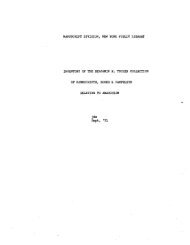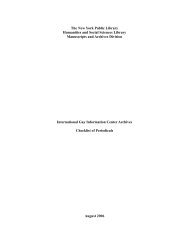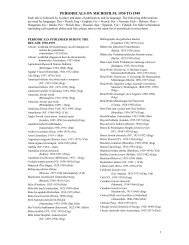pdf available - Multiple Choices
pdf available - Multiple Choices
pdf available - Multiple Choices
You also want an ePaper? Increase the reach of your titles
YUMPU automatically turns print PDFs into web optimized ePapers that Google loves.
to their villages singing hoarsely and with their<br />
faces banged up from having gotten into fistfights<br />
with their drinking companions.<br />
The Village Population<br />
In this area it must be pointed out that, except for<br />
agriculture as practiced by the local landowners<br />
and a few German and Czech settlers, the state of<br />
farming was backward and primitive compared<br />
with other areas of the country.<br />
Many villagers, with holdings too small and<br />
poor from which to make a living, were forced to<br />
look for work outside the village and went to<br />
work during the harvest for the large landowners<br />
gathering potatoes, sugar beets, and other produce,<br />
and during the winter they worked for the<br />
lessees of the forests (mostly Jews), chopping<br />
down trees and bringing them to the sawmill or to<br />
the train<br />
I remember well how the villagers wandered<br />
around at the end of summer and the<br />
beginning of fall, as great numbers of them went<br />
through the city to the railway station, on their<br />
way to their tasks and then on their way back<br />
home. Sometimes they would stay over and<br />
become "guests" of the train station for a day or<br />
two, in order to continue enjoying the sight of the<br />
trains coming and going.<br />
Most of the village population was illiterate;<br />
they were slow moving, apathetic, and lazy, and<br />
their comprehension very slow. Ignorance was<br />
deeply rooted, as if it were destined. The elders<br />
were very pious in their Orthodox religion and<br />
went to church quite often. There was a lot of<br />
superstition among the village population, steeped<br />
in obscurantism. They tended to believe any sort<br />
of fabulous tale.<br />
It's no wonder then that the city-folk, both<br />
Jewish and non-Jewish, saw the muzhiks as inferior<br />
an d took a superior attitude to them. For our<br />
parents the word "goy" meant someone oafish<br />
and silly, such as the village muzhiks, and for<br />
every sin we committed regarding religious matters<br />
we got rebuked with, "A goy like you!"<br />
The term oorl (uncircumcised) also was part<br />
of everyday speech when two Jews were having<br />
it out in front of the non-Jew while haggling over<br />
prices. When a muzhik and a Jew exchanged<br />
THE EARLY DAYS 49<br />
insults and rebukes in the heat of the moment,<br />
while buying or selling, it was really viewed as<br />
"nothing" and soon the injury was redressed and<br />
the bargaining continued to a satisfactory conclusion.<br />
The Jews had specific terms when referring<br />
to gentiles, and these were evidence of the spiritual<br />
and emotional distance between the two<br />
worlds.<br />
In normal times the relationship between<br />
Jews and gentiles was more or less stable, without<br />
anything out of the ordinary occurring. Jewish<br />
families scattered in the surrounding villages had<br />
nothing to fear. They even visited and stayed over<br />
in non-Jewish homes (though they did not eat<br />
anything because it was not kosher), and there<br />
were many Jews who sought out the villagers for<br />
business.<br />
Jewish Occupations<br />
Most of the Jews in the town either engaged in<br />
various crafts or were small businessmen, while a<br />
minority were in industry and wholesale merchandising.<br />
The main craftsmen were shoemakers<br />
and various types of tailors, stitchers (who cut<br />
and sewed the uppers and were known as<br />
zagatovtschiks), masons and builders, hatmakers<br />
and furriers, tinsmiths and blacksmiths, wagon<br />
makers, carpenters, painters, barbers, butchers,<br />
and bakers.<br />
The bakers worked mostly the nights before<br />
market days and fairs, selling to the villagers, as<br />
during the rest of the week Jews baked their own<br />
challas and bread. The wagon-drivers had a semiskilled<br />
profession, both those who had well-caredfor<br />
horses and handsome buggies or nice wagons<br />
for carrying passengers and packages to the train<br />
and to neighboring towns, and the drikers, who<br />
carried lighter freight within town in their rickety<br />
wagons hitched to a single, lame, undernourished<br />
horse.<br />
Some merchants exported agricultural produce,<br />
such as eggs, cattle, horses, grain, skins,<br />
furs, bristles, fish, fresh and dried fruits, lumber,<br />
mushrooms, etc. The export reached the large<br />
cities of Poland, especially Warsaw, and also<br />
Danzig and Germany, through Silesia.<br />
There also were some businessmen who<br />
leased forests and fruit orchards. Workmen,







